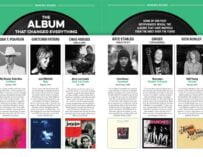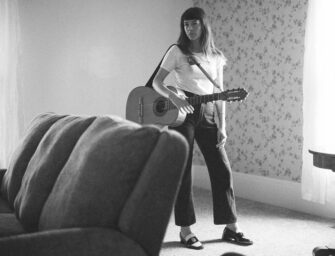As he prepares to release his second album, we catch up with Harper Simon, a singer-songwriter with an illustrious pedigree
Naturally, we wanted to know if this marked a conscious effort on Harper’s part to move away from his father’s musical stomping grounds; whether the new direction was perhaps the sound of him finding his own voice. But we weren’t allowed to ask. “I’m not comfortable answering any questions that relate to members of my family,” we were told bluntly at the start of the interview. And that, as Rudyard Kipling once put it, was that.
Ah well, never mind. Luckily, Division Street is a strong enough album not to need a back-story – however intriguing that back-story might have been! It also features an array of accomplished players that includes Nikolai Fraiture (The Strokes) on bass, and Pete Thomas (Elvis Costello & The Attractions) on drums. And here’s what Harper had to tell us about it.
The new album is a more psychedelically-inclined offering than the first. It reminds us of Love in several places, and also at times of The Byrds…
Well both those bands have influenced me, certainly. Actually the first song on the album, Veterans Parade, that did always kind of remind me of Love. What I was trying to for with that song was… what I always liked about Love was their brand of psychedelia had kind of a menacing edge, it was a little bit mean. Psychedelia with anger! It’s the same thing I hear in Flaming Lips today, the same thing I heard in Elliott Smith. Whereas the first album, I’d say was more Byrds-y… Sweetheart Of The Rodeo especially.
Interesting you mention Elliott Smith… is that why you chose [Smith producer] Tom Rothrock to produce Division Street?
Partly, yes, because I admired his work with Elliott Smith and Beck. But also because Tom mixed the first album as well, and that had worked really well… and because he’s right here in LA with his own studio, which is a lot more convenient than relocating to Nashville! The whole album was recorded at Tom’s house, in fact, except that Nikolai did some overdubs in New York.
Actually, I guess it’s fair to say yes, because I think when I started recording this album I had more of an Elliott Smith kind of feel in mind. But the album got more sort of rocky as it went on… compared to Elliott Smith I’d say it’s less Beatles, more the Velvets and the Stones.
“I’m quite a slow writer”
The album’s been three years in the making. Why so long?
Well, it was actually ready a year ago, but there were some hold-ups, with a change of management and stuff, which means it’s only coming out now; ideally I’d have liked it only to be a two-year gap. But yeah: we did the first album, toured and promoted it for a year, and then started to write this one. I’m quite a slow writer, especially when it comes to lyrics.
It’s interesting you say that… describe the process, then.
Songs usually start with a melody for me. All the time, I’m accumulating little structures and melodies on the guitar. Then I’ll sit down with Pete and we’ll start piecing them together, bash through the structures, get a melody and tempo for each song, which takes about a week or so. Then we’ll start recording, and keep developing the melodies, just with placekeeper lyrics. Then when that’s done, I’ll go away and write the lyrics. The lyrics usually come last.
Go away where? Do you have a specific place or time of day that you like to write?
I go to libraries, actually! They’re quiet and you’ve got lots of reference books and sources of inspiration to hand, and going there gives me some structured time to sit down and write songs. Writing Division Street, I was basically at the public library every day for three or four months.
We’ve had a lot of different answers to that question, but no-one’s ever mentioned the library! Can you give us an example where that’s particularly helped?
Yes, the song Just Like St Theresa. Writing that in the library meant I could look her up, read her biography, read her letters, and look for quotes and phrases, things that might connect into her life and her writing.
“There aren’t many people who come up with great lyrics”
It sounds like your lyrics are quite painstakingly produced…
Definitely: music comes much more naturally to me. Coming up with structures on the guitar is easy in comparison – it takes me a lot longer to come up with enough decent lines to fill a whole album! The trouble is, I don’t think enough people do… there aren’t many people who come up with consistently great lyrics. Elliott Smith was one… Stuart Murdoch from Belle & Sebastian… Chan Marshall (Cat Power) is another, but there aren’t many.
I think you need to put the time in. If there’s a line in a song that mentions a flower, then trust me, that flower’s been a tulip, a rose, a peony, all kinds of things before it finally becomes whatever flower it is. It’s a long process and it can be quite agonising. Or quite dull.
Would you describe yourself as something of a perfectionist, then?
Well, I wouldn’t say the album is perfect, so I guess not! But certainly, I never tried harder than this before to make sure everything really stands up. If you write a song and one of the lines is weak, but you can’t figure out to get rid of it and end up recording that line… you’ll end up not liking that song any more, not wanting to perform it. So I think it’s better to spend time getting it right, but it can be quite anxiety-inducing!
So what advice would you give any young songwriters who are just starting out?
Get very specific about what words you would like to be acquainted with, and which will just sound pretentious. Compared to someone writing novels or poetry, your vocabulary as a lyricist is actually quite narrow: there are so many words you just can’t use. Get to know your boundaries.
And then, do your homework! Listen to the songwriters you admire and really study their lyrics, deconstruct them, and try to understand their craft. But don’t just copy them – you also need to make sure that what you’re writing is true to you.
One song we wanted to ask you about was Breathe Out Love. That refrain, “I breathe in suffering, I breathe out love” is just beautiful! How did that come about?
Thank you! That actually comes from a meditation technique called Tonglen. My friend told me about it, it’s about being mindful, basically, and the mantra is “I inhale suffering, I exhale love”. I changed it to ‘breathe in, breathe out’ because it sounded better. But yeah, that came as a chorus pretty much straight from the mantra, and the rest of the song kind of came from there.
“I always said I wanted to make four albums”
So what’s next for Harper Simon?
Well, I always said I wanted to make four albums. I’ve been making music my whole life, I started playing Clash and Ramones songs on the guitar when I was 11 and I was always in bands or doing session work or touring with someone as a guitar player, all my life. But when I decided it was time to be a solo artist, which didn’t happen till I was 33, then I said I wanted to make four albums. And that’s still the plan.
Why four?
Four just seems like a reasonable body of work. A lot of great artists made about four albums: I’m thinking the Pixies, Nirvana, Jimi Hendrix… four seems like it’s substantial enough to make a mark, less than that isn’t really going to sustain you. So yeah, definitely four albums, and then after that who knows? Maybe I’ll continue as solo artist, maybe I’ll do some music for film.
I don’t think I’d want to be in a band again – I like being solo, most bands are a misery to be in! – but I can’t ever imagine not making music one way or another. In the meantime, there’ll be a tour of some kind but don’t ask me about the details, they haven’t been finalised. It depends what’s… economically feasible.
Do you find it frustrating, on that note, to be working in indie-land… that you don’t have a major label promo budget to play with?
Well, I’m not making pop music, I’m not in that field, so I don’t mind not being in the Top 40 and stuff. That’s not my branch of the tree! Lately though it does seem hard, if you’re doing indie anything – if you’re making music, if you’re a film-maker – to make the numbers work. So obviously I’d like the album to sell enough that I get to make another one!
That’s all I ask for, really. I’m not bothered about superstardom, I’d rather just make music that I think is good, that can be respected by… by me. I think that’s all anyone can do with any integrity, really. You just have to make the best record you can make for you.
Interview: Russell Deeks
Division Street by Harper Simon is out on PIAS on 25 March

































Related Articles